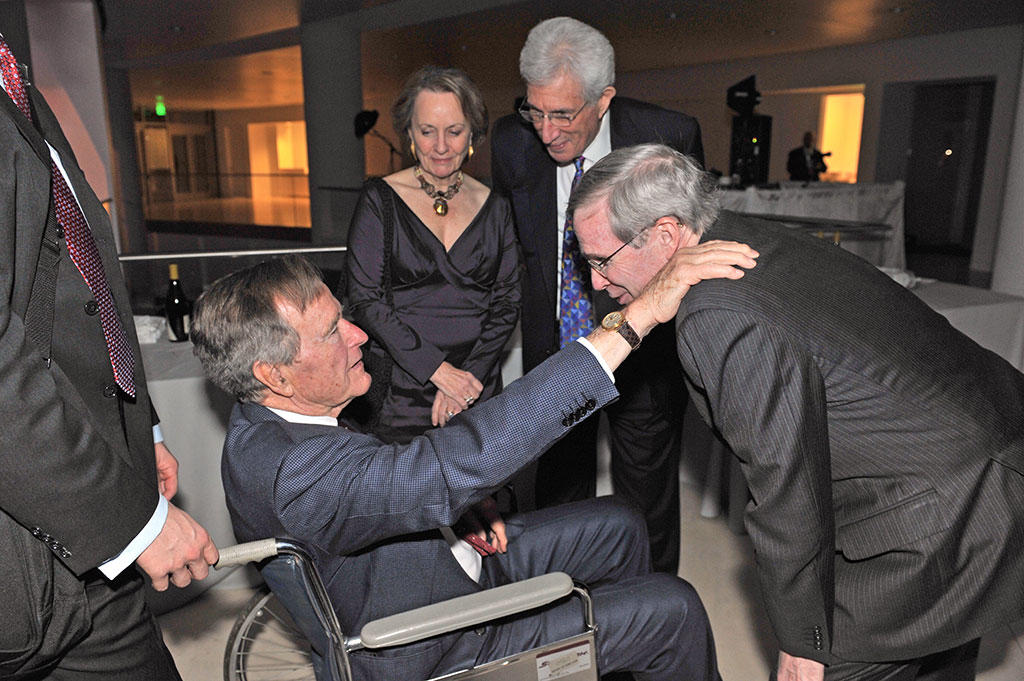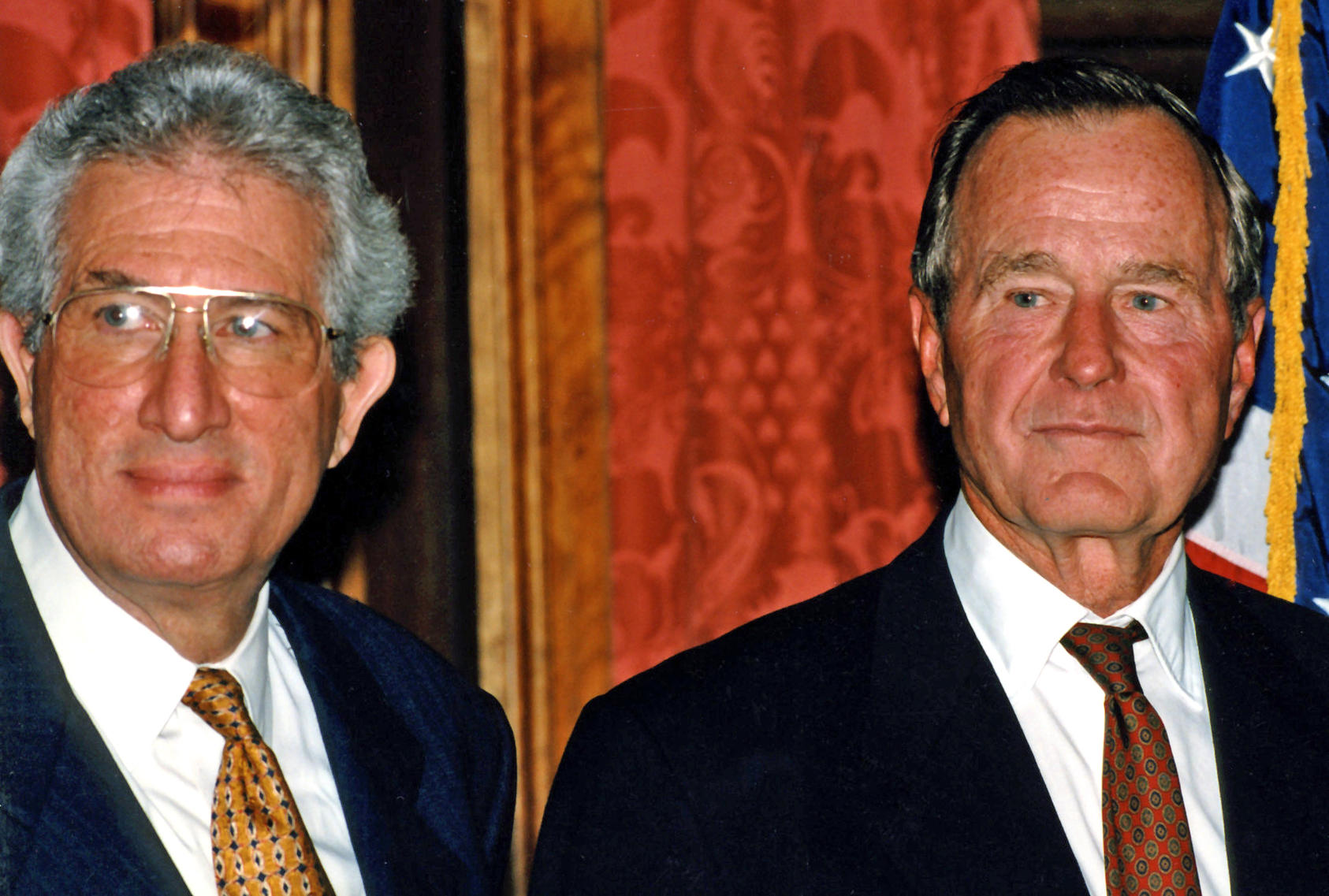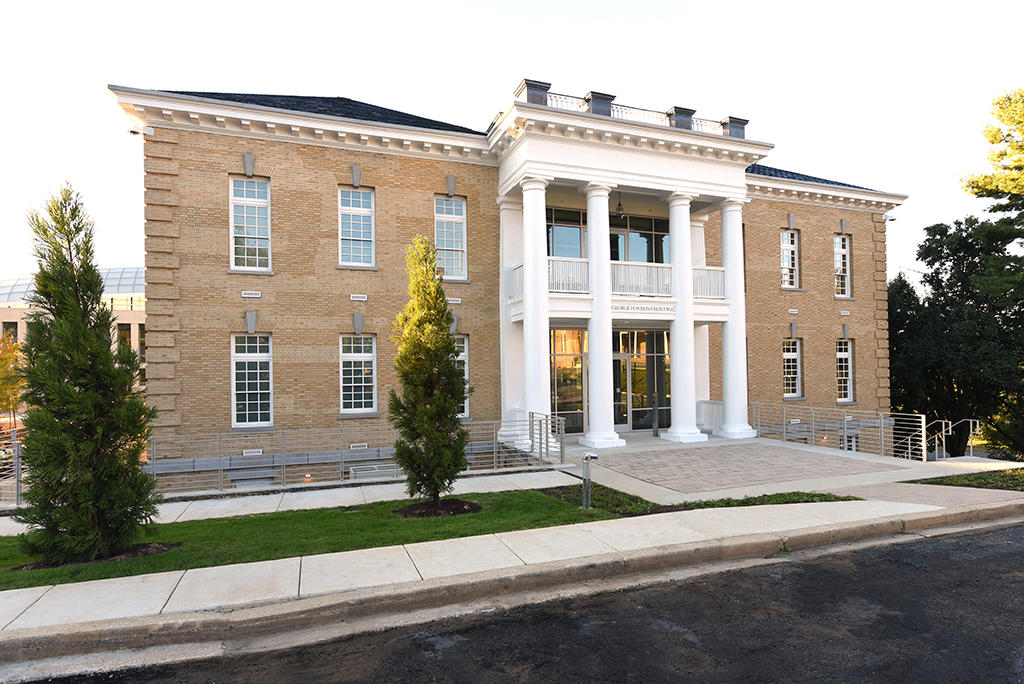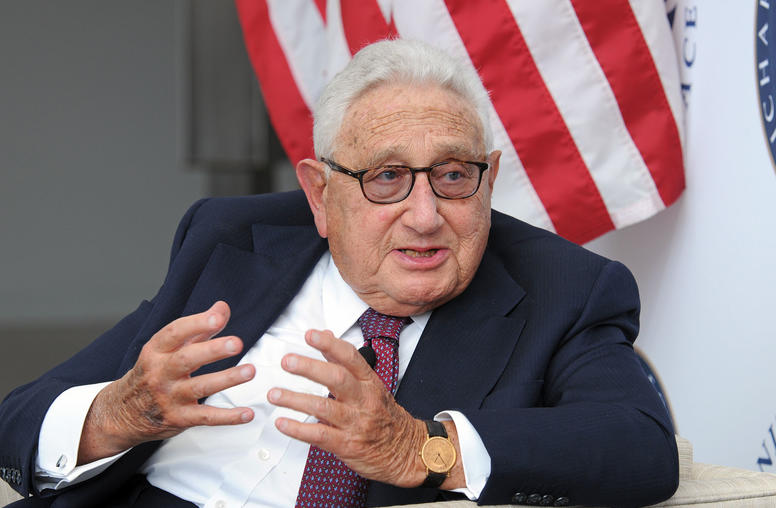In Memoriam: George H.W. Bush
The U.S. Institute of Peace mourns the death of America’s 41st president, George H.W. Bush, who guided the United States and the international community through the collapse of the Soviet Union, the end of the Cold War and a reduction in the superpowers’ nuclear arsenals. President Bush was the modern American president most directly experienced as a diplomat and the most recent to have fought in war—experiences that shaped him as a national and global leader. As president, he forged strong international coalitions that reversed Iraqi dictator Saddam Hussein’s 1990 seizure of Kuwait, reunited Germany and Europe after the fall of communism, and managed difficult geopolitical transitions that followed the Cold War.

“George H.W. Bush presided over the end of the Cold War,” noted USIP’s board chair Stephen J. Hadley. “His skillful diplomacy led the United States and the Soviet Union to abandon their ideological struggle and to negotiate a series of arms control agreements that liquidated military arsenals built up over decades,” said Hadley, who served under Bush as assistant secretary of defense. “Thus ended the most dangerous confrontation the world has ever known, without a shot being fired by either side,” said Hadley, who also was the national security advisor to President Bush’s son, President George W. Bush.
“President Bush’s skill at finding compromise amid conflict and his successful bipartisanship were invaluable in the leadership he offered our nation and the world during a period of international turmoil and historic change,” said USIP’s president, Nancy Lindborg. “The U.S. Institute of Peace honored his contributions this year by inaugurating, with his support, the George H.W. Bush Peace Education Center on its campus.”
Combat Veteran and Diplomat
Among 20th century U.S. presidents, George Herbert Walker Bush, was one of few—alongside Teddy Roosevelt and Dwight Eisenhower—to have entered office with personal experiences of both fighting war and leading international peacemaking. Six months after the bombing of Pearl Harbor, Bush enlisted in the Navy on his 18th birthday to become the Navy’s youngest pilot and to fly 58 combat missions in the Pacific. Leading a flight of torpedo bombers, Lieutenant Bush “pressed home an attack in the face of intense anti-aircraft fire,” the Navy reported. His plane was crippled and Bush was the only one of three crew members able to bail out and survive.

In the 1970s, Bush served as ambassador to the United Nations, and then as America’s first senior envoy to China. He and his wife, Barbara Bush, astonished and delighted their Chinese hosts with a warm, unassuming demeanor that included touring the city of Beijing on their bicycles. President Bush’s friends and political foes alike described his personal humility and basic respect for others as foundations of a management style that enabled him to find compromises and build strong coalitions as a political and government leader.
“He was an honorable, gracious and decent man who believed in the United States, our Constitution, our institutions and our shared future,” President Bush’s political rival, President Bill Clinton, wrote yesterday in the Washington Post. “Though he could be tough in a political fight, he was in it for the right reasons: People always came before politics, patriotism before partisanship,” said Clinton. The two former presidents forged a warm working relationship, notably in joint humanitarian missions following the Southeast Asia tsunami of 2004 and Hurricane Katrina’s devastation of the U.S. Gulf Coast in 2005.
Though he could be tough in a political fight, he was in it for the right reasons: People always came before politics, patriotism before partisanship.
Building Peace: ‘Character is Destiny’
“The Greeks understood this: character is destiny,” said Bush’s biographer, the former Newsweek editor Jon Meacham. George Bush “was born with an innate empathy” toward others that was visible as a schoolboy, when he became famous for sharing his lunchtime desserts with his friends, Meacham recalled in 2016. “There’s a direct line” between that personal generosity and the empathetic insights that let Bush influence foreign leaders, Meacham said.
Bush’s “refusal to gloat or declare victory during the collapse of the Soviet empire helped Mikhail Gorbachev and diffused a possible backlash from the hardliners in the Soviet government,” wrote national security scholar Stephen Knott. “Although the Bush administration often had little control over the unfolding of world events, its responses helped avoid chaos,” Knott wrote in a review of President Bush’s impact and legacy.
President Bush’s approach helped usher in an unparalleled period of peace, unity and prosperity in Europe, and of U.S. partnership with Russia under President Boris Yeltsin. Bush “was a transformative president,” Meacham said. “He packed eight years of action into four,” responding to crises of China’s crackdown on peaceful protests in “Tiananmen Square, of a Gulf War, the end of the Soviet Union, fall of the Berlin Wall, negotiation of NAFTA.”
President Bush and USIP
Alongside his well-known foreign policy successes, President Bush also strengthened the foundations of America’s ability to build peace, including through USIP. He appointed to the Institute’s Board of Directors senior U.S. diplomats and public figures who helped lead the Institute during a crucial transition—from a more narrowly research-focused mission to one that includes direct stabilization and peacebuilding work in conflict zones.
President Bush’s appointees were central in selecting USIP’s longest-serving president, Richard Solomon. They included Ambassador Chester Crocker, the former assistant secretary of state for Africa, who led the USIP board for 12 years as it expanded its fieldwork into the Balkans, Iraq and other war zones; Ambassador Max Kampelman, the former chief U.S. negotiator on nuclear arms limitation; the Reverend Theodore Hesburgh, the president emeritus of the University of Notre Dame; and Mary Louise Smith, the former Republican Party chairwoman.

This year, USIP honored President Bush’s leadership in building peace by naming a new facility—the George H.W. Bush Peace Education Center—in his honor. “We are grateful that we were able to offer that gesture of respect for President Bush during his lifetime,” said Hadley. “He supported our congressional mandate, and shared our sense of commitment, to strengthen our nation’s ability to wage peace—and we are proud to honor his legacy in this way.”
